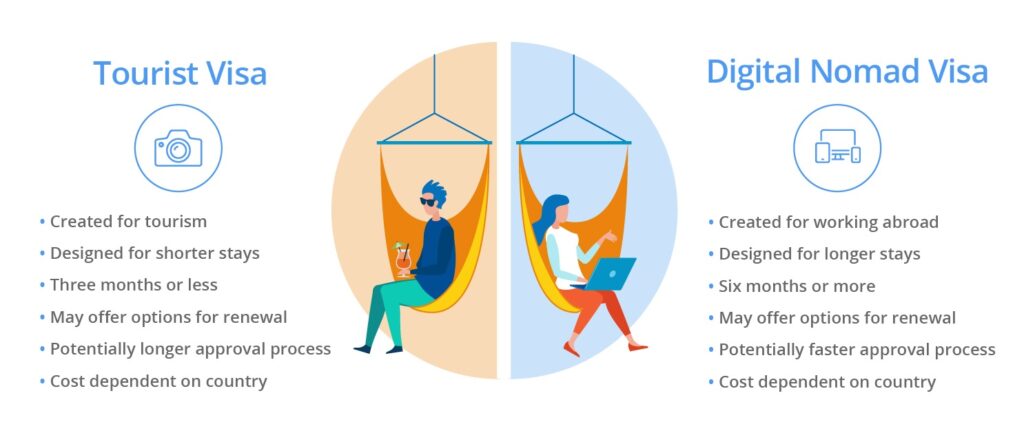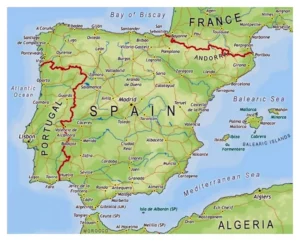The concept of a digital nomad visa is a novel one, but it continues to gain momentum rapidly. Not only does it offer individuals greater freedom in merging their work and lifestyle preferences, but it also allows countries to stimulate their economies and diversify their communities. The future of work may be remote, and these visa arrangements represent a critical shift in acknowledging and accommodating that future at the international level.
As the future of work is being fundamentally altered, not just by evolving technologies and working methodologies, but also by a new class of professionals who have chosen to shrug off the conventional constraints of geography. These individuals, known as digital nomads, hinge their lifestyle on the “location independence” concept, working remotely from foreign countries, coffee shops, public libraries, co-working spaces, or recreational vehicles.
Given this emerging trend, various countries worldwide have begun to recognise the potential economic benefits these remote workers could bring. In response, they’ve introduced an entirely new type of visa; the Digital Nomad Visa. The Digital Nomad Visa allows individuals to work legally in the visa-issuing country without being a citizen or permanent resident. It bridges the gap between tourist visas, which typically don’t allow for paid work, and traditional work visas, which are often tied to a specific job or employer in the host country.

Now! Let’s delve deeper into the subject by exploring each of the countries’ unique proposition for digital nomads while throwing light on their specific visa policies:
- Estonia: As the pioneer in introducing the Digital Nomad Visa, Estonia is open to both long-term and short-term stay applications. The visa allows digital nomads to stay for up to one year. Applicants must provide evidence of employment with a company registered outside Estonia or work as freelancers for clients mostly outside of Estonia. A minimum gross monthly income of €3504 (during the six months preceding the application) is one criterion for eligibility.
- Barbados: The Barbadian Government launched the 12-Month Barbados Welcome Stamp, a unique ‘work from paradise’ scheme. To qualify, applicants must attest an expected income of $50,000 USD or more over the next 12 months or have the means to support themselves, their spouse or partner, and dependants, if any.
- Bermuda: Bermuda’s certificate is called “Work from Bermuda” and is applicable to digital nomads and students. The application fee is $263, and the turnaround time in terms of application processing is fast. Prospective applicants should demonstrate employment with a legitimate company or their own company registered and operating overseas.
- Georgia: Under its “Remotely from Georgia” scheme, the nation invites foreign citizens who are freelancers or are conducting business activity from abroad to visit and work from Georgia while travel restrictions are in place. The income threshold required to be eligible for this program is $2000 per month.
- Spain: Spain’s non-lucrative visa permits you to live in Spain, albeit without the right to undertake any economic activity locally as the primary source of income should be outside Spain. While it’s not strictly a digital nomad visa, it is a popular choice among foreign remote workers. One of the fundamental requirements is demonstrating a stable and sufficient income to sustain yourself (and your dependents, if any) during your stay. You’ll also need to show that you have health insurance with full coverage in Spain. This visa allows you to stay in Spain for up to a year, and it’s renewable.
- Portugal: Portugal has a self-employment visa that’s often used by digital nomads. This visa lets you live and work in Portugal for a year, and it may be renewed for two-year periods. Applicants typically must show proof of professional qualifications (where applicable) and evidence that they have the financial means to support themselves. This includes either a contract for providing services or proof of setup or acquisition of a business. Portugal also offers a D7 (“Passive Income”) Visa, which can be an excellent fit for digital nomads with reliable sources of regular income, such as property, financial investments, or pensions.
- Costa Rica: Costa Rica’s digital nomad visa, otherwise known as the Rentista Visa, demands applicants to demonstrate a steady monthly income of $2500 for a minimum of two years or deposit $60,000 in a Costa Rican bank. The visa is valid for two years, and extendable as long as the financial conditions are met.
- Czech Republic: To obtain the Czech Republic’s ‘Zivno Visa’ or ‘Long-term Business Visa,’ applicants need to register for trade licensing within the country. The process may be a bit more convoluted due to the business-like nature, but it offers a longer duration of stay and could be a route to eventual permanent residency.
- Dubai (UAE): Dubai’s one-year virtual working program requires passport-holders with at least six months validity, health insurance coverage with UAE coverage, and proof of employment with a one-year contract or ownership of the company. The person’s income should be $5000 per month, and the program’s application fee is $287.
It may seem daunting to navigate these diverse requirements related to digital nomad visas. Still, the effort usually yields the reward of being able to experience the world, not just as a fleeting visitor but as an integral part of different communities. Just as the world continues to evolve, shrinking into an interconnected web, such trends will undoubtedly keep gaining relevance, underlining an upcoming age of borderless exchange and experience. Each country presents its unique blend of culture, lifestyle, and work ethic, presenting digital nomads with a wonderful, experiential palette to choose from.
Remember that each nation’s requirements for their digital nomad visas may differ. Therefore, it’s crucial to check each country’s embassy or immigration department’s official portals to garner the most accurate information about eligibility, procedures, documentation, and other prerequisites. Individuals may need to demonstrate proof of their remoted employment, financial stability, and approved international insurance coverage, among other things.




